- To begin with, can you tell us how you first got involved in the theater world?
- I had never even seen a theater play before I entered university. When I entered Keio University I joined a club in hopes of learning about movie making, which had been a big interest of mine. But it turned out that the club was actually more involved in theater than in movie making. Since all the new students were expected to take part in the [theater] performance, I was drawn into it, starting as a lighting assistant.
- What made you continue to get more deeply involved in theater rather than quitting there?
- I had wanted to try my hand at writing scenarios or scripts. Before I had a chance to make a movie I got involved in writing scripts for plays, and in the process I naturally became interested in directing, too.
- What kinds of works were you writing at that time?
- I entered university in 1992, which was the year of the final performance of Hideki Noda’s “Yume no Yumin-sha.” I had heard Noda’s name but had never really had any interest in seeing his work. When I finally did, however, it was very stimulating for me at the time. And for some time after that the plays I wrote were influenced by Noda’s works. Of course, the style wasn’t exactly the same, but the flow of the words, can I say, or the way the principle behind the movement of the words takes the play in unexpected directions… that was something of his that I imitated at first.
- It seems to me that Noda’s works are very different from the style of your plays now. Was there a gradual shift, or was there some big turning point that brought a sudden change?
- About the year I graduated, I did experience a major turning point when I read the book Gendai Kogo Engeki no Tame ni (For Contemporary Colloquial Theater) by Oriza Hirata. I believe what Hirata was saying is that it is strange if there is any self-consciousness in the words when an actor is speaking his or her lines, and that theory of acting and theater influenced me very much. I think this is the point of origin for what I am doing now. Before I read that book, I had taken part in a two-day workshop by Hirata. I was very much inspired by his method of diverting the actor’s consciousness of the script by intentionally placing some kind of physical burden on the actor.
- What do you mean by a physical burden on the actor?
-
One example is having two conversations going on at the same time on stage. While the actor is talking to someone on this side of the stage there is another conversation going on across the stage, so the actor has to move his part of the script along while also reacting to the other conversation… that kind of situation. This definitely an easily apparent way of splitting the actor’s consciousness of the script.
At the same time there was another book I read that had quite an impact on me, which I found very interesting. It was Bertolt Brecht’s book Konnichi no Sekai wa Engeki ni yotte Saigen dekiruka (Can the theater reproduce the current world?). I was very much inspired by his criticism of the idea of “the fourth wall” (that invisible boundary between the stage and the audience, the idea that the actors are conscious of this fourth wall).
For me there was a smooth and natural connection between what Brecht was saying and what Hirata was saying. It is very clear to me that Brecht and Hirata are the starting point, the foundation of what I am doing now. - From this you invented the unique script language that is now being called “super-real verbal Japanese. What was the process that led to this?
-
One of the things that led me to start writing these scripts full of inarticulate lines, these lines that never seem to get to the point, clearly came from my experience from a part-time job I had once of transcribing the contents of interview tapes. The tapes were from interviews with local people in regional communities conducted by a think tank seeking ways to stimulate the culture and economies of the communities.
Making the transcripts was a tedious job, but at the same time there was something very interesting about it. That was because as you transcribed it word for word, you couldn’t understand what the people were trying to say. But somehow, by the end of the conversation it began to make sense and you could see what they had been trying to say, even though their words themselves were not saying anything clearly or articulately. This surprising realization was an important one for me.
However, when I am writing a play I don’t use the technique of transcribing from tapes of spoken conversations. I write it all myself. So, some people might say I should try to write scripts that are more articulate (laughs). But if I did that, part of what is important to me would be lost. I reproduce the real, inarticulate way that average people actually speak, because one of the things I want to express is what lies within that ineptness, the larger content. - Is it that you want the audience to experience the fascination of being able to understand the overall gist of what is being said even though the individual details of what is said are virtually incomprehensible?
- More than that, there is the fact that this is what our verbal life is actually like. That is the important thing to me. What I am saying is “Isn’t this the way we actually speak?” Of course, it is possible to criticize this kind of verbal life, but I have no interest in saying whether it is good or bad, or criticizing it. We are actually living in this kind of verbal environment. Some people might say that since we are living in such an inarticulate world, we should at least try to use articulate Japanese in our theater. But I think that is a rather limited attitude. To me this Japanese that people actually use is even richer and more positive.
- Your type of real Japanese where one sentence runs into the next without break and the subjects are deleted from the sentences until you are uncertain who the subjects is anymore, this also gives the script an aspect of ambiguity.
- There is a separate point of departure behind that aspect. For the festival held at the Yokohama ST Spot, I wrote a solo-actor play titled “On the Harmful Effects of Marijuana” playing on the title of the Chekhov play On the Harmful Effects of Tobacco. At the time I got the idea of how interesting it would be if someone who is talking about a friend gradually goes through a transformation to become the friend himself. Since then, I came to write plays where several characters would go through this kind of transformation process. Behind this idea there is also a novel by William Faulkner. In the novel Absalom, Absalom!, the characters are reflected in the writing style, and I thought that this device would be even more interesting and effective if used in theater.
- But aren’t there some people who say it is irritating or boring to watch the kind of development you use in your plays?
- There are (laughs).
- Is there anything you do to appease these bored people in the audience?
- If their boredom comes from the fact that I myself have not succeeded in my attempt to give expression to my vision, I would feel that I should do something to remedy that. But if that boredom comes from a rejection of what I feel to be rich in substance, the things I want to show, in other words the fundamental essence of what I want to express, then there is nothing I can do about that.
- I believe that there is a fictional aspect to the work of writing a play…
- In terms of the work of the playwright, the compositional aspect, what I am thinking about is continuance. I don’t create an overall scenario outline before I begin writing a play. That is because the most important thing for me is that there should be true continuity in the way one scene leads into the next.
- At the start of your plays there is someone who delivers a line saying, “Now we are going to be doing such and such…” Is this like the opening line of the fairy tales that says, “Once upon a time, long, long ago…?” That fictional phrase that sets the stage for a story that is absolutely removed from everyday life?
- That is not a part of my work as a playwright. It is more like a bit of service for the audience to make the play a bit easier to understand. If we say “Now we are going to be doing such and such …” then the audience thinks, “Oh, that is what they are going to be doing.” That’s all it is (laughs).
- Do you consciously think about the rhythm of your scripts? When I read the script itself, it has a very rhythmical feeling to it.
- That is not something I am conscious of when I write. A play is something that is intended to be spoken. So it should be something that you want to recite aloud and something that gains meaning when said out loud. To say that you feel a rhythm when you are just reading the text silently is nice to hear, but I reject any type of deliberate rhythmical bodily presentation of the script lines when the play is actually staged. I believe that the body of the actor should have a unique movement that is separate from the rhythm of the script. Whether or not you feel rhythm when you are reading the text silently or not has nothing to do with what I am trying to achieve when I write.
- I hear that when the editors made a book of your plays, they went to a lot of trouble to add punctuation to the text. Maybe that is the reason that I feel that rhythmic quality to it.
- In my original script I use almost no commas or periods (laughs).
- In addition to the unique character of your scripts, we also see very unique body movement by the actors in your plays.
- This goes back to the influence I received from Hirata, about diverting the consciousness of the lines by shifting consciousness to the body. In this respect I have continued to follow Hirata’s example. But, just as focusing too much attention of the words kills them, shifting too much attention to the body movement also kills the body presence. Therefore, you can’t shift the consciousness to the body either. So, where should you focus the consciousness…? To explain what comes next is very difficult, and we can speak in terms of image or signifié (thing to be signified), but in essence what I mean is that there must be something within the human being that precedes the script or the bodily expression. When you say something or make a gesture, there must be some underlying reason, something inside that is the origin. That is where I want to take the consciousness. That is what I am now encouraging the actors to develop within themselves in the studio when we practice and rehearse.
- Is that image different from the “impulse” that Stanislavsky talks about? Or the “motivation” that Japan’s New Theater directors often speak of?
-
I don’t know Stanislavsky or Strasberg or New Theater well enough to answer that. In fact it might be the same. It wouldn’t be surprising to me if it was the same. All I am saying is that having a source within where every word or movement originates is an extremely essential element of theater.
However, the image that I think is essential is not the image of the “recipient”, the person watching the play. If the image of the recipient is the sadness or joy that emerges after they read the play, that is not the image I am referring to. As far as I can see, I would say that the large majority of performances present the script from the image of the recipient. But I believe that acting in a way where the lines are spoken on the basis of an image gained from the script is completely wrong. What I am talking about is the image in the internal point of origin of all words and movements. - When you work with actors in the studio, you substitute the physical exercises that most theater companies use before starting a rehearsal with an exercise where you have the actors practice speaking by just talking on and on about things that have occurred during their day. What is the purpose of this unusual form of training?
-
Rather than thinking of it as practice in talking, the purpose is to get the actors to recognize how they actually move their bodies when they are speaking normally in daily life. And also to get them to be aware of the fact that those movements do not originate in the words they are speaking. To explain this a little further, this exercise gets people to see how difficult it would be to think up such complex movements if the everyday things they are talking about were written down and given to the actor as a script and the actor had to try to create those movements based on that script. So, once you understand this, my exercise is training that helps the actors create as fiction the same actions that fit the normal, everyday body use.
Another purpose is as a form of training to gain an appreciation of just how rich this that I am talking about is. In other words, how rich the origin before words is. By rich I mean that there is a much larger volume of information underlying any words that we speak. There is no way to put everything in that original image into words. The words are no more than the tip of the iceberg we see, and it is an attempt to create awareness of this. State from the opposite direction, for an actor to try to create the minimum amount of image necessary when delivering some lines from a script, that is a meaningless and uninteresting thing. So this is also a kind of training to get the actor to grasp what is happening within themselves so that they can create an image from that vastly larger well of information from which the lines of the script have originated.
I am always telling the actors that the body and the words are not connected or integrated. In reality, it is extremely rare for body movements to complement or reinforce the words we are speaking, and most of the time our movements are completely unrelated to our speech. I think that nature of the body is something very rich. And in that sense, I think that our natural, real body movements are richer than those of actors on the stage. That is why I want to get closer to the richness of the actual body by creating plays that are modeled on reality. - There is always a veil covering reality that makes it difficult to see in daily life. But watching your plays, we seem to feel that that veil is removed and we are seeing the raw face of reality. Don’t you think that is possible?
- What I am often told with regard to that is that after seeing one of my plays, people will find that on the train going home they see a guy get on the train moving in the same oddball ways that our actors do (laughs). Well, that is just a side-effect and not what I am actually aiming at. But speaking in broad terms, I will be content if I get the same kind of effect as Juro Kara in his tent plays where at the climax the tent is suddenly opened up and you get a momentary glimpse of the real world.
- This may be an extension of that search for the rich body, but you are also involved in dance, aren’t you?
- Actually it was initially the people in the dance world that took an interest in my plays. People in the theater world didn’t take an interest in my work until I won the Kishida Drama Award (laughs). Part of the reason is that the Yokohama ST Spot where I was originally active is an important center for the contemporary dance scene, and when I did a joint performance with the dancer Natsuko Tezuka, a lot of dance people came and took an interest in what I was doing. Then, as things developed, I eventually began taking part in dance festivals (laughs).
- What were your dances “Cooler,” “Mansion” and “Tissue?”
- Those are mindless names, aren’t they (laughs)? Although there is very little script to them, they are basically the same in nature as my plays. In my plays, the conversations themselves are really banal in their content but they connect to something else that’s larger. In the case of the dances they just remain banal. That’s the only difference (laughs). Another difference is that in the dances there is a little more stress on the movements that seem unrelated to the words. Since the dances are performed in larger halls the movement becomes more exaggerated.
- Earlier you mentioned that you were influenced by Brecht. In your play Five Days in March that won the Kishida Award, the motif is the Iraq War. It seems that you have some thoughts about the deep relationship between reality and theater and the function of theater in the real world.
-
I think these questions that should be answered separately. First of all, let’s set the Iraq War aside and talk about theater’s role in the real world. I feel ill at ease with the idea that because theater takes place in the closed space of the hall, it can be treated as a world of fiction. Shall we say the lie of the “fourth wall.” In fact, the audience is there and the duration of the play is a time that is shared with the audience. Said in another way, I don’t think that theater comes apart if you remove that fourth wall.
As for the other question, I would like to say something about what I was thinking at the time of Five Days in March . I was thinking that I wanted to say something about war, for example I feel that committing ourselves to anti-war movements doesn’t seem to fit us. Still we do have some feelings. We have this attitude that involves concern with some degree of distance, but it is not that we are not concerned. That is the idea that I wanted to show, involving that distance. Some people see this as a work showing young people who have no concern at all about the war and are only interested in sex, but I personally think of this as a firm anti-war play. - Earlier you spoke about the richness of reality, but is there a division within you between the rich reality and the realities that you want to make a commitment to change?
- There are realities that I want to change, and this may be a contradiction, but on the other hand I feel that there are people who are trying to make us feel that, “You guys are living an impoverished reality. There is a richer way of life.” I don’t want to become trapped in that kind of mentality. I am not saying the reality is happy or that life is rich, what I want to show through my plays when seen as theater is the rich potential of the individual people who are moving in the presence of complex factors and mechanisms surrounding them.
- What is your new work Mokutekichi (Destination) like?
- A young couple is living in a new housing block and the wife is pregnant. That is all that the story is really about (laughs). The reason I chose this as the subject is that I have a child and I want to explore the uncertainties and moral questions involved in giving birth to and raising children and whether it is even right to have children in times like these. Of course, since I know that it is impossible to answer these questions, I am not trying to give any answers. I just wanted to put the questions out there.
- I hear that there is a plan to translate Five Days in March into French and publish it. If you have the opportunity for an overseas performance of your company Chelfitsch, how would you like to stage it?
- The problem would be the language. Since there are no plans for such a performance, this is just a supposition, but rather than using subtitles or headset commentary, I would probably place an interpreter on stage as one of the actors. I think that kind of style would be viable with my works.
Toshiki Okada
The adventurous world of Toshiki Okada,
a playwright who write in "super-real
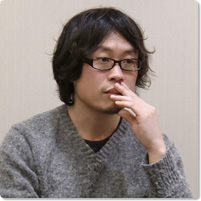
Toshiki Okada
Born in Yokohama in 1973, lives in Kumamoto prefecture. Okada is a playwright and novelist. As founder of the theatrical company chelfitsch, he is the writer and director of the company’s productions. In 2005, he won the 49th Kishida Kunio Drama Award for Five days in March. Since then, he became the focus of attention for his activities both at home and abroad. In 2008, His novel The End of the Special Time We Were Allowed received the 2nd Ōe Kenzaburō Prize. From 2016, he directed repertory works of the Munich Kammerspiele theater company for four seasons. In 2020, his work The Vacuum Cleaner was selected as one of the “ten remarkable productions” by (Berliner) Theatertreffen. In 2020, Okada’s stage adaptation of the Thai novelist Uthis Haemamool’s original novel, titled Pratthana – A Portrait of Possession won the 27th Yomiuri Theater Awards, Selection Committee Special Prize. In 2021, he attempted directing an opera for the first time with Yuzuru. In these ways, Okada continues to expand his range of activities.
chelfitsch
https://chelfitsch.net/en/
Interviewer: Hirofumi Okano
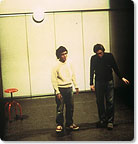
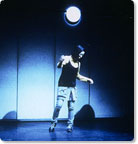
Chelfitsch
Sangatsu no Itsukakan
(Five Days in March)
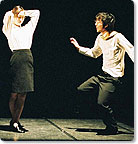
Chelfitsch
Cooler
(Air Conditioner)
© non takagi
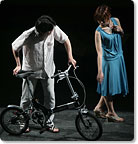
Chelfitsch
Mokutekichi
(Destination)
(From the “Summer Festival 2005 of Biwako Hall”)
Photo: Chiharu Nishioka
Related Tags

